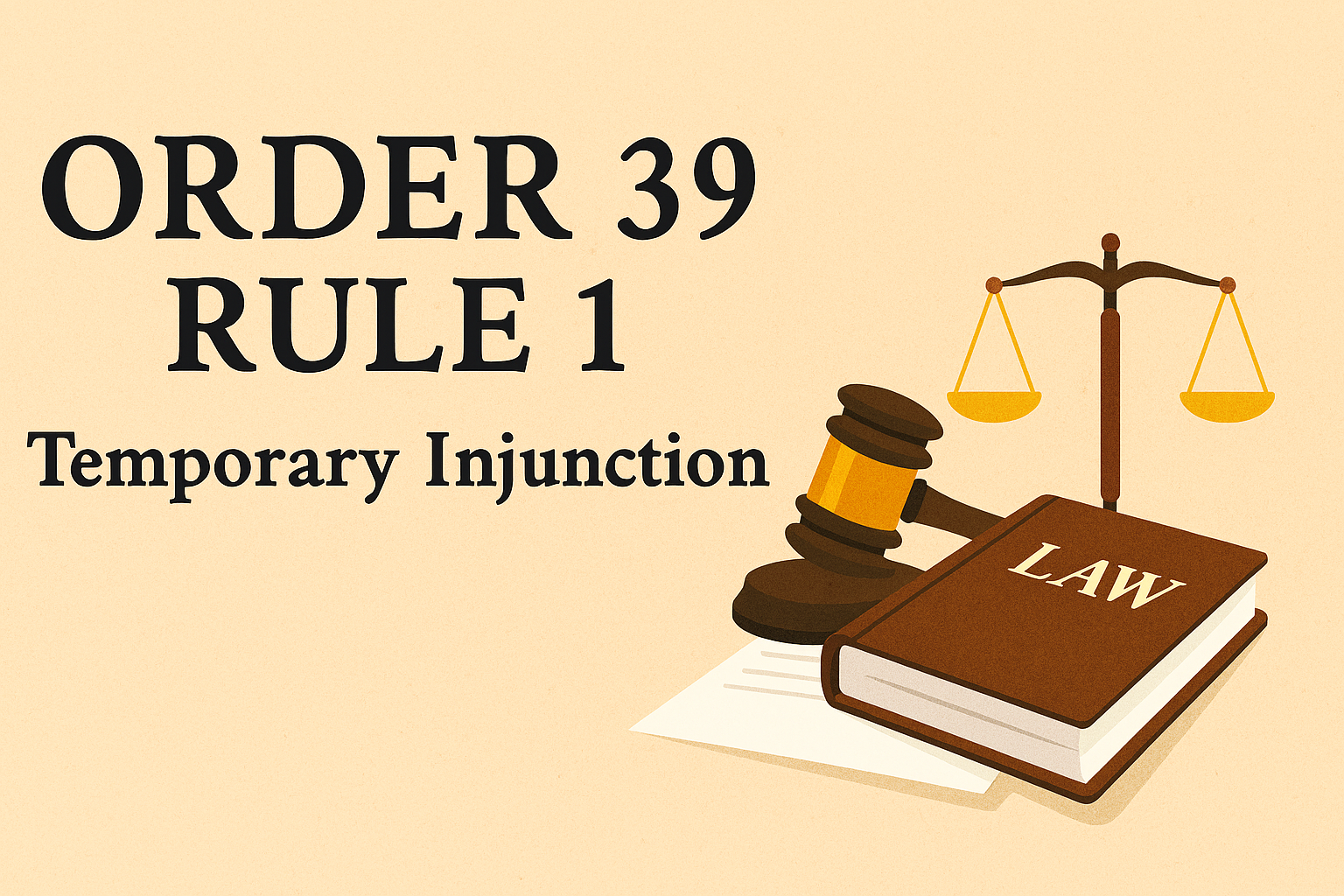In civil litigation, delays are inevitable. A lawsuit may take months or even years before a final judgment is delivered. But what happens if, during that time, the defendant sells the disputed property or destroys evidence? Justice could be rendered meaningless.
That is where Order 39 Rule 1 of the Code of Civil Procedure, 1908 (CPC), comes into play. This provision empowers courts to issue temporary injunctions, safeguarding the rights of parties until the case concludes. It ensures that the subject matter of the dispute remains protected, preserving fairness in judicial proceedings.
Understanding Order 39 Rule 1 CPC
Order 39 Rule 1 CPC deals with situations where immediate intervention is required to prevent irreparable damage. It empowers courts to grant temporary injunctions in three key situations:
- When property in dispute is at risk of being wasted, damaged, or wrongfully sold.
- When a defendant threatens to remove or dispose of property to defraud creditors.
- When the defendant threatens to dispossess or cause injury to the plaintiff.
In all these cases, the court can stop the wrongful act before it is too late.
Historical background of injunction laws
The concept of injunctions originates from English equity courts, which stepped in where strict legal remedies failed. India, adopting this principle, codified injunction provisions under Order 39 of the CPC. Over the years, Indian courts enriched its scope with equitable principles, making Order 39 Rule 1 a strong pillar of civil justice.
Meaning of temporary injunction under Order 39 Rule 1
A temporary injunction is an order restraining a party from doing a particular act until the trial concludes or until further court orders. Under Order 39 Rule 1, injunctions act as a shield preventing harm before it occurs. Unlike permanent injunctions (granted after final judgment), temporary injunctions preserve matters during litigation.
Objectives of Order 39 Rule 1
The primary objective of Order 39 Rule 1 is to maintain the status quo. By preventing one party from exploiting time delays in litigation, it ensures justice is not defeated. It protects rights, prevents fraud, and maintains fairness in disputes.
Essential conditions for granting an injunction
Courts grant injunctions under Order 39 Rule 1 only when three essential conditions are met:
- Prima facie case: The applicant must show a strong case worth trial.
- Balance of convenience: The harm caused by refusing an injunction must outweigh the harm caused by granting it.
- Irreparable harm: The injury must be one that money cannot adequately compensate.
For example, if a builder threatens to demolish an ancestral property, monetary damages later may not undo the emotional and cultural loss.
Who can apply under Order 39 Rule 1?
Both plaintiffs and defendants may apply for injunctions. For example, if a defendant faces wrongful dispossession by the plaintiff, they too can seek protection under Order 39 Rule 1.
Power of the court under Order 39 Rule 1
The power of the court is discretionary but guided by equity and justice. The court cannot grant injunctions mechanically; it must examine whether genuine urgency exists. Judicial discretion prevents abuse while ensuring fairness.
Situations where Order 39 Rule 1 applies
- Property disputes – preventing illegal possession or sale.
- Commercial disputes – restraining breach of contracts.
- Intellectual property cases – stopping copyright piracy or trademark misuse.
- Family disputes – preventing transfer of matrimonial assets.
Procedure for filing an injunction application
- File an application along with a plaint.
- Submit affidavits and supporting documents.
- Argue before the court for urgency.
- Court issues notice or grants ex parte injunction.
Order 39 Rule 1 and property disputes
Property disputes are the most common under Order 39 Rule 1. Suppose a landlord tries to evict a tenant without due process or a co-owner secretly sells property. In such cases, injunctions protect lawful possession.
Case Law: Dalpat Kumar v. Prahlad Singh (1992) – Supreme Court held that injunctions are discretionary and must be granted only when essential conditions are met.
Order 39 Rule 1 in commercial matters
In business, injunctions prevent parties from violating contracts or misusing trade secrets. For example, a company may seek an injunction to stop a supplier from selling confidential designs to competitors.
Case Law: American Cyanamid Co. v. Ethicon Ltd. (1975, UK) – Laid down principles for granting injunctions, influencing Indian courts.
Role of Order 39 Rule 1 in intellectual property cases
Piracy and counterfeiting can destroy businesses overnight. Courts frequently use Order 39 Rule 1 to stop unauthorized use of trademarks, copyrights, or patents.
Case Law: Yahoo! Inc. v. Akash Arora (1999) – Delhi High Court granted injunction against domain name misuse, protecting brand identity.
Difference between temporary and permanent injunction
Feature | Temporary Injunction (Order 39 Rule 1) | Permanent Injunction |
Duration | Until case is decided | After final decree |
Nature | Interim relief | Final relief |
Purpose | Preserve status quo | Enforce rights permanently |
Judicial interpretation of Order 39 Rule 1
Courts interpret Order 39 Rule 1 broadly but cautiously. They balance urgency against misuse.
- Seema Arshad Zaheer v. MC of Greater Mumbai (2006) – SC emphasized fairness and equity in granting injunctions.
- Dalpat Kumar v. Prahlad Singh (1992) – SC clarified that prima facie case alone is not enough; all three conditions must be satisfied.
Limitations of Order 39 Rule 1
- Risk of misuse by delaying genuine claims.
- Burdening courts with frivolous applications.
- Requires judicial vigilance to maintain balance.
Enforcement of injunction orders
Disobeying injunctions under Order 39 Rule 1 can lead to contempt of court. Penalties include fines, property attachment, or imprisonment.
Order 39 Rule 1 and ex parte injunctions
Ex parte injunctions are granted without hearing the other side, but only in urgent cases. Courts ensure transparency by requiring applicants to disclose all relevant facts honestly.
Order 39 Rule 1 and natural justice
Natural justice demands fairness. Therefore, ex parte orders are temporary, and courts quickly hear the opposite party to confirm or modify the injunction.
Case studies on Order 39 Rule 1
- Builder-buyer disputes: Courts often stop builders from selling flats to multiple buyers.
- Trademark misuse: Businesses have successfully restrained competitors from using deceptive marks.
- Family inheritance disputes: Courts prevent illegal partition or sale of ancestral property.
Recent amendments affecting Order 39 Rule 1
Though the CPC hasn’t drastically changed Order 39 Rule 1, judicial reforms encourage faster disposal of injunction applications to reduce misuse.
Critical analysis of Order 39 Rule 1
Strengths:
- Protects justice during delays.
- Preserves property and rights.
Weaknesses:
- Risk of abuse.
- Lengthy litigation despite interim protection.
Global perspective on injunction laws
- UK: Strong reliance on equitable remedies; “American Cyanamid principles” guide injunctions.
- USA: Temporary restraining orders (TROs) serve similar function. Courts emphasize proportionality and damages.
- India: Broader discretionary powers under Order 39 Rule 1, but slower enforcement.
Future scope of Order 39 Rule 1
With increasing property frauds, online piracy, and commercial disputes, reliance on Order 39 Rule 1 will grow. Digital asset protection may soon fall under its scope.
Conclusion
Order 39 Rule 1 is a powerful safeguard in civil law. It ensures disputes are fairly decided by preventing irreversible harm during litigation. While misuse exists, judicial checks maintain balance. This provision continues to play a vital role in India’s justice system, protecting rights and maintaining equity.

Frequently Asked Questions.
It allows courts to grant temporary injunctions to prevent irreparable harm in civil disputes.
Prima facie case, balance of convenience, and irreparable harm.
Yes, but only in urgent cases where delay may defeat justice.
No, it provides temporary relief until trial concludes.
They may face contempt of court, fines, or imprisonment.
Yes, especially in property, commercial, and intellectual property disputes.
